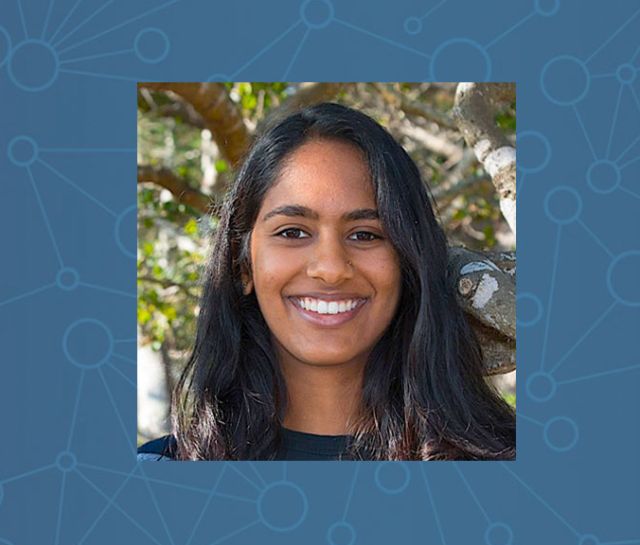Tummala – Womxn in Science & Engineering
ECE PhD student Neeli Tummala featured in article about the UCSB chapter of Womxn in Science and Engineering (WiSE)

College of Engineering News – "Strength in Knowledge"
An electrical and computer engineering (ECE) PhD student at UC Santa Barbara, Neeli Tummala studies how a person’s tactile system, or sense of touch, encodes information from the environment, and she uses that knowledge to create better haptic devices, robots, and prosthetics, as well as to develop tools and techniques that aid people with sensory disorders. With graduation less than six months away, Tummala felt hesitant if pursuing a faculty position was the right decision for her.
“In my department, 13 percent of the faculty members are women. In my classes and in other academic settings, I have frequently been one of the few, if not the only, woman in the room,” explained Tummala, who is advised by associate professor Yon Visell. “These experiences often make me doubt that I can be a female faculty member.”
Ellie Arrington, a PhD student in the Interdepartmental Graduate Program in Marine Sciences (IGPMS) at UCSB, shared those sentiments, even as she applied for faculty positions.
“The topic of applying for a professorship can be a bit anxiety-inducing and triggers the all-too-common imposter syndrome,” said Arrington, referring to the inability to believe that one’s success is deserved or is the result of one’s own efforts or skills.
Yangying Zhu, an assistant professor of mechanical engineering, knew exactly what Tummala and Arrington were experiencing, which was why she sprang into action to create a workshop for female and non-binary graduate students and postdocs who were interested in becoming professors.
“When I was a postdoc, I attended a workshop that was for women planning to pursue careers in academia, and it was really helpful,” said Zhu. “I thought that it would be great to pass on important knowledge to our students face-to-face before they begin applying and interviewing for faculty positions. It can help build their confidence and show them that if I can do it, they can too.”
Zhu partnered with the university’s chapter of Womxn in Science and Engineering (WiSE), a graduate-student organization dedicated to promoting equal opportunity and inclusion of women and traditionally underserved people in science, technology, engineering, and mathematics (STEM). In just two months, they planned their first "Preparation for Professorship" workshop for female and non-binary graduate students and postdocs, opting to keep the event small to ensure an intimate setting.
“There are so many unknowns about our future careers as we move on from graduate school, so we wanted this to be a low-pressure and comfortable space to hear some hard-hitting truths,” explained Sara Matsumura, an IGPMS PhD student and vice president of WiSE. “We aimed to help students connect with professors and future colleagues, as well as dismantle some underlying hesitations and angst and replace them with a sense of community.”
More than fifteen female faculty members from nearly a dozen STEM disciplines across campus either presented or participated in discussion panels. Topics included how to prepare and deliver research statements, how to balance work and life, how to apply and interview for jobs, as well as how to write grant proposals.
“I enjoyed sharing my insights into research statements with the participants,” said materials professor Susanne Stemmer. “I thought a particularly useful aspect of this workshop was that it offered a range of perspectives about best practices for faculty applications.”
“It was exciting to see so many female and female-identifying science and engineering PhD students considering careers in academia,” said Elizabeth Belding, a computer science professor and the College of Engineering’s associate dean of diversity, equity, and inclusion, who participated in the work-life balance panel. “The benefits of a career in academia are many. I enjoyed the opportunity to share my thoughts and personal experiences with this terrific group."
The twenty-five graduate students and postdocs who attended the workshop, including Tummala and Arrington, left with a new perspective and the knowledge necessary to pursue professorships.
“The event was very helpful for me, and I feel more prepared,” said Arrington. “The all-female room had a supportive atmosphere and helped me learn productively without getting distracted by my frustrations and anxieties. Hearing about how they all approached their applications and careers, some with young children, was very inspirational.”
“Prior to the event, my idea of the preparation necessary to continue in academia was nebulous and intimidating. But this event helped put everything in perspective,” said Tummala. “I learned about the interview process, as well as activities I should actively pursue during my postdoc to improve my faculty applications, including serving as a reviewer on grant panels, being involved in grant writing, and putting together a strong group of references.”
Organizers plan to host a workshop next year, but on a much grander scale.
“We want to open it up to all graduate students and postdocs to help everyone who is considering careers in academia, because it can be very intimidating,” said Matsumura.
“The goal is to broaden our impact by providing this opportunity to anyone who needs it,” said Zhu. “There is strength in knowledge.”